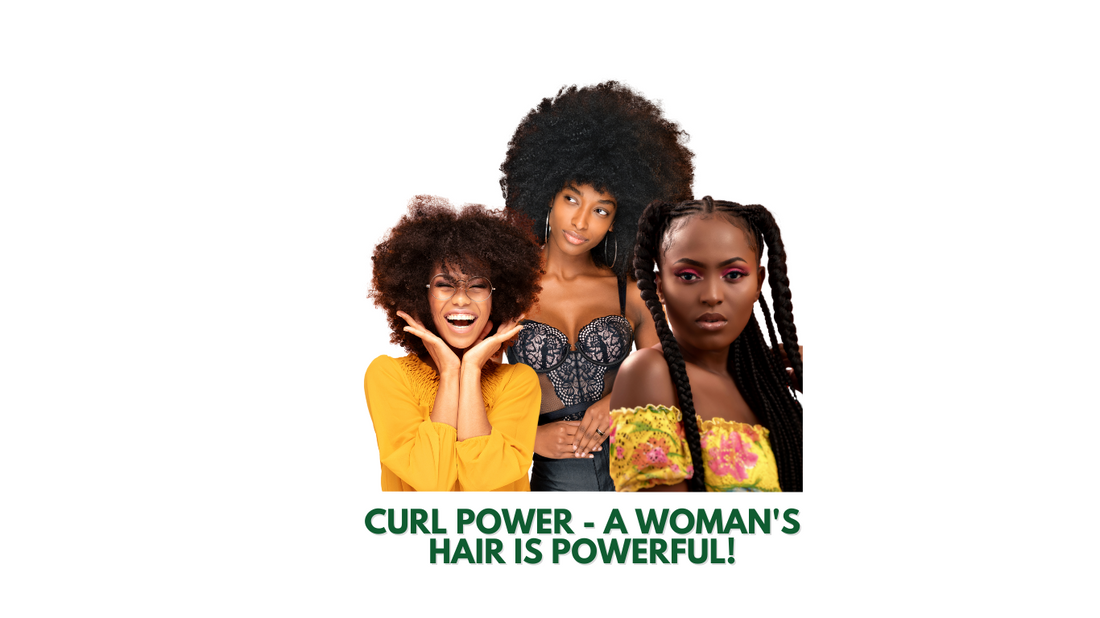In a world where beauty standards often dictate conformity, there's a revolution that has taken place - one that celebrates the natural, the authentic, and the unapologetically unique. At the forefront of this movement is the majestic realm of curly hair. With each coil and twist, it tells a story of resilience, diversity, and empowerment. Join us as we delve into the captivating journey of curly hair - from its historical significance to its modern-day resurgence as a symbol of strength, identity, and self-love. Get ready to embrace the power of your curls and unleash your inner goddess with "Curl Power: A Woman's Hair is Powerful."
A woman’s hair has been more than just something that grows on the top of her head. Whether it’s a representation of her cultural heritage, socioeconomic status, relationship dynamics, personal identity, and even her sexuality.
While there are many women who use their hair as a conduit for deeper, I’ve created a list of a few of my personal favorites.

Madame CJ Walker (1867-1919) was not merely an entrepreneur; she was a visionary, a philanthropist, and a trailblazer who left an indelible mark on American history as the first female self-made millionaire. Her journey to success began with a simple yet profound realization: the power of hair.
Born Sarah Breedlove in 1867, Madame Walker, like countless African American women of her time, struggled to find hair care products that suited her needs. Faced with the harsh realities of available options, she embarked on a quest for solutions. Initially working as a commission agent for Annie T. Malone's Poro Company, Madame Walker's own battle with a scalp condition led her to explore homemade remedies and store-bought cosmetics.
Through relentless experimentation and unwavering determination, Madame Walker discovered the formula that would revolutionize the hair care industry: "Madam Walker's Wonderful Hair Grower." This breakthrough not only transformed her own hair but also laid the foundation for her empire, known as "The Walker System."

Madame C.J. sold “The Walker System” which included a shampoo, a pomade, strenuous brushing, and applying iron combs to hair. The business was headquartered in Indianapolis which included a factory, hair salon, a beauty school to train sales agents, and a laboratory. From there business quickly flourished and a new image for hair culture started and for the first time in history, an African American woman was featured in a before-and-after photo for a cosmetic advertisement.
Beyond revolutionizing the beauty industry, Madame Walker devoted herself to uplifting her community. She traveled extensively, educating African American women on hair care, financial literacy, and entrepreneurship. By the time of her passing in 1919, Madame Walker had not only achieved remarkable wealth, she was considered the wealthiest African American business woman and wealthiest self-made woman in the country. She had also established herself as a pioneer in the modern African American hair care industry.
Her legacy endures as a testament to the transformative power of determination, innovation, and resilience. Madame C.J. Walker remains an icon of empowerment, inspiring generations to pursue their dreams and defy the odds.

Angela Davis (1944-present ) is widely acclaimed as a scholar, educator, philosopher, and formidable political activist. Prior to the 1960s, African Americans often felt pressured to conform to societal norms by straightening their hair. However, the transformative era of the 1960s, marked by the fervent Civil Rights Movement, heralded a revolutionary shift known as the "Black Is Beautiful" movement. This movement infused with a newfound sense of identity and pride, redefined beauty standards within the African American community. It instilled a deep appreciation for black beauty, affirming that one's skin, facial features, and natural hair were admirable. Central to this movement was the iconic Afro, which emerged as a potent symbol of political resistance and black empowerment. It was viewed at that time as "militant" or "threatening" due to African Americans' refusal to assimilate to European-centric cultures.
Marcus Garvey, a prominent advocate for black empowerment, fervently encouraged black women to embrace their natural kinks and coils. He passionately argued that conforming to Eurocentric standards of beauty amounted to a betrayal of one's intrinsic worth and heritage. His poignant words, "Don't remove the kinks from your hair! Remove them from your brain!" echoed a powerful call to reclaim agency and celebrate the inherent beauty of blackness.
Angela Davis boldly sported the Afro as a potent symbol of Black Power and defiance against narrow American beauty norms. Embracing the Afro wasn't just a hairstyle choice, it represented an entire movement. It was a revolutionary act, wielding hair as a weapon in the struggle for racial equality. Each coil and curl served as a public declaration of self-love and solidarity within the black community.
A central figure in the civil rights movement of the 1960s and 70s, Angela Davis embodied the ethos of resistance both inside and out. Her activism mirrored the essence of the Afro era, embodying strength, defiance, and unwavering commitment to justice. Through her iconic hairstyle, she harnessed the power needed to advocate for herself and her community, elevating the Afro beyond mere fashion to a potent emblem of empowerment and defiance.
Cecily Tyson (1924-2021) shattered norms and paved the way for Black beauty and representation, making an indelible mark on history.
In an era where societal pressures dictated that Black women conform to Eurocentric beauty standards, Tyson fearlessly challenged the status quo. As the first person to proudly showcase cornrows on television, she boldly normalized natural hairstyles, igniting a cultural revolution. Her iconic appearance on the cover of Jet Magazine, adorned with traditional African cornrows, resonated deeply, sparking a surge in popularity for cornrow "updos" with intricate designs.
Tyson's commitment to embracing her natural hair extended beyond mere personal expression; it was a deliberate celebration of Black culture and tradition. Despite facing critics, including Black hairstylists who feared losing business, Tyson remained steadfast in her convictions.
As the first Black actor to star in a dramatic television series, Tyson continued to defy conventions, proudly wearing her hair in an Afro and later donning cornrow on screen. Her groundbreaking choices challenged stereotypes and inspired countless individuals to embrace their heritage and identity.
As we honor Tyson's illustrious legacy as an actor, let us also recognize the profound impact of her advocacy for Black beauty and representation. Through her courage, resilience, and unwavering commitment to authenticity, Tyson blazed trails, shattered barriers, and left an enduring legacy that continues to inspire and empower generations to come.

Grace Jones (1948-present) hailing from Spanish Town, Jamaica, and nurtured in the vibrant streets of New York, stands as an iconic figure, a legendary actress, model, and singer whose influence transcends generations. In a bold move that defied convention, Jones boldly shaved off all her hair in the late '60s, unveiling a strikingly abstract appearance that captivated the world.
Treating her signature flat-top fade as a living sculpture, Jones transformed her hairstyle into a canvas, adorning it with intricate geometric shapes and elaborate etchings, earning her a reputation as one of the most daring visionaries of her time. In doing so, she shattered mainstream beauty standards and redefined the narrative of natural hair beauty and liberation.
The high-top fade, traditionally associated with masculinity, became a symbol of empowerment and defiance under Jones's fearless gaze. By fearlessly embracing this traditionally masculine look, Jones paved the way for countless Black women to express themselves freely, transcending gender norms and celebrating their unique beauty.
Grace Jones epitomized the essence of androgyny and challenged society's narrow definitions of beauty. Her influence reverberates through pop culture to this day, serving as a beacon of inspiration for Black hair culture and beyond.
Indeed, a woman's hair is a crown of glory, a reflection of her inner essence and individuality. With each curl, coil, and kink you have the power to make a statement, to embrace your unique beauty and rock your curls with unapologetic confidence. So, let us seize the power of our hair, celebrating its diversity and embracing the beauty of our natural selves. Rock the Power, Rock your Curls

